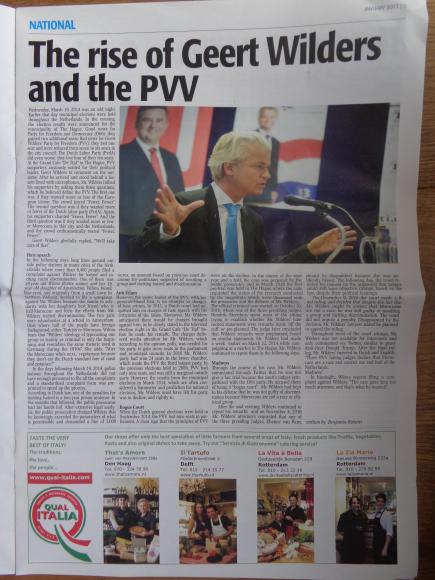- Nederlands
- English
January 2017: NATIONAL: The Rise of Geert Wilders and the PVV

Hate speechIn the following days long lines queued outside police stations in many cities of the Netherlands where more than 6,400 people filed a complaint against Wilders for hatred and inciting racial discrimination. One of them was 49-year old Wilma (fictive name), and her 16-year old daughter of Amsterdam. Wilma, blond, blue-eyed, and originally from a small town in northern Holland, decided to file a complaint against Mr. Wilders because she stands in solidarity with her daughter's best friend who is half-Moroccan and feels the effects from Mr. Wilders incited discrimination. The two girls were schoolmates at a school in Amsterdam-Oost where half of the pupils have foreign background, either Turkish or Moroccan. Wilma fears that "Wilders' ideology of typecasting one group in society as criminal is only the beginning, and resembles the same rhetoric used in Germany during the 1930s". She adds, "After the Moroccans who's next... vegetarians because they don't eat the Dutch standard fare of meat and potatoes?"In the days following March 19, 2014, police stations throughout the Netherlands did not have enough personnel to file all the complaints and a standardized complaint form was pre-printed to speed up the process.According to Dutch law, one of the penalties for inciting hatred is a two-year prison sentence. In the months that followed, the public prosecutor had his hands full. After extensive legal analysis, the public prosecution charged Wilders that he knowingly exceeded the parameters of what is permissible and demanded a fine of 5,000 euros, an amount based on previous court decisions for politicians suspected of insulting a group and inciting hatred and discrimination. Anti-Islam
However, the iconic leader of the PVV, with his peroxide-blond hair, is no stranger to charges of hate crimes. In 2011, a Dutch court had acquitted him on charges of hate speech with his criticisms of the Islam. Moreover, Mr. Wilders anticipated there would be charges brought against him, as he clearly stated in the televised election night in the Grand Cafe "De Tijd" before he made his remark. The charges delivered media attention for Mr. Wilders, which according to the opinion polls, was needed for his party to gain more seats in the parliament and municipal councils. In 2010 Mr. Wilders' party had won 24 seats in the lower chamber, which made the PVV the third largest party. In the previous elections held in 2006, PVV had only 9 seats, and was still a marginal outside party. However, the results from the municipal elections in March 2014, which are often considered a barometer and prediction for national elections, Mr. Wilders must have felt his party was in decline, and rightly so.
Bogus Court
When the Dutch general elections were held in September 2014, the PVV lost 9 seats in parliament. A clear sign that the principles of PVV were on the decline. In the course of the next year and a half, the case was prepared by the public prosecutor, and in March 2016 the first pre-trial was held in The Hague where the state requested the status of the research conducted by the magistrate which were discussed with the prosecutor and the defense of Mr. Wilders.
The official criminal case started on October 31, 2016, where one of the three presiding judges, Hendrik Steenhuis spent most of the sitting trying to establish whether Mr. Wilders' hate incited statements were remarks made 'off the cuff' or pre-planned. The judge later concluded that Wilders' remarks were preplanned, based on similar statements Mr. Wilders had made week a earlier on March 12, 2014 while campaigning at a market in The Hague. Mr. Wilders continued to repeat them in the following days.
Madness
Through the course of his case, Mr. Wilders commented through Twitter that he was not give a fair trial because the court's judges sympathized with the D66 party. He accused them of being a "bogus court". Mr. Wilders had kept to his defense that he was not guilty of discrimination because Moroccans are not a race or ethnical group.
After the said evening, Wilders continued to repeat his remarks and on November 4, 2016 Mr. Wilders' attorney's requested that one of the three presiding judges, Elianne van Rens, should be disqualified because she was politically biased. The following day, the court rejected his request on the argument that judges could still have objective rulings, based on the law, despite their political leanings.
On December 9, 2016 the court made a final ruling and decided that despite the fact that Mr. Wilders might be correct that Moroccans are not a race, he was still guilty of insulting a group and inciting discrimination. The court did not impose a penalty. Disappointed by the decision, Mr. Wilders' lawyers stated he planned to appeal the ruling.
Throughout most of the court sittings, Mr. Wilders was not available for interviews and only commented via Twitter, similar to president-elect Donald Trump. After the final ruling, Mr. Wilders' Twittered in Dutch and English: "Three PVV hating judges declare that Moroccans are a race and convict me and half of the Netherlands.
Madness".
In hindsight, Wilma regrets filing a complaint against Wilders. "The case gave him too much attention, and that's what he wanted".